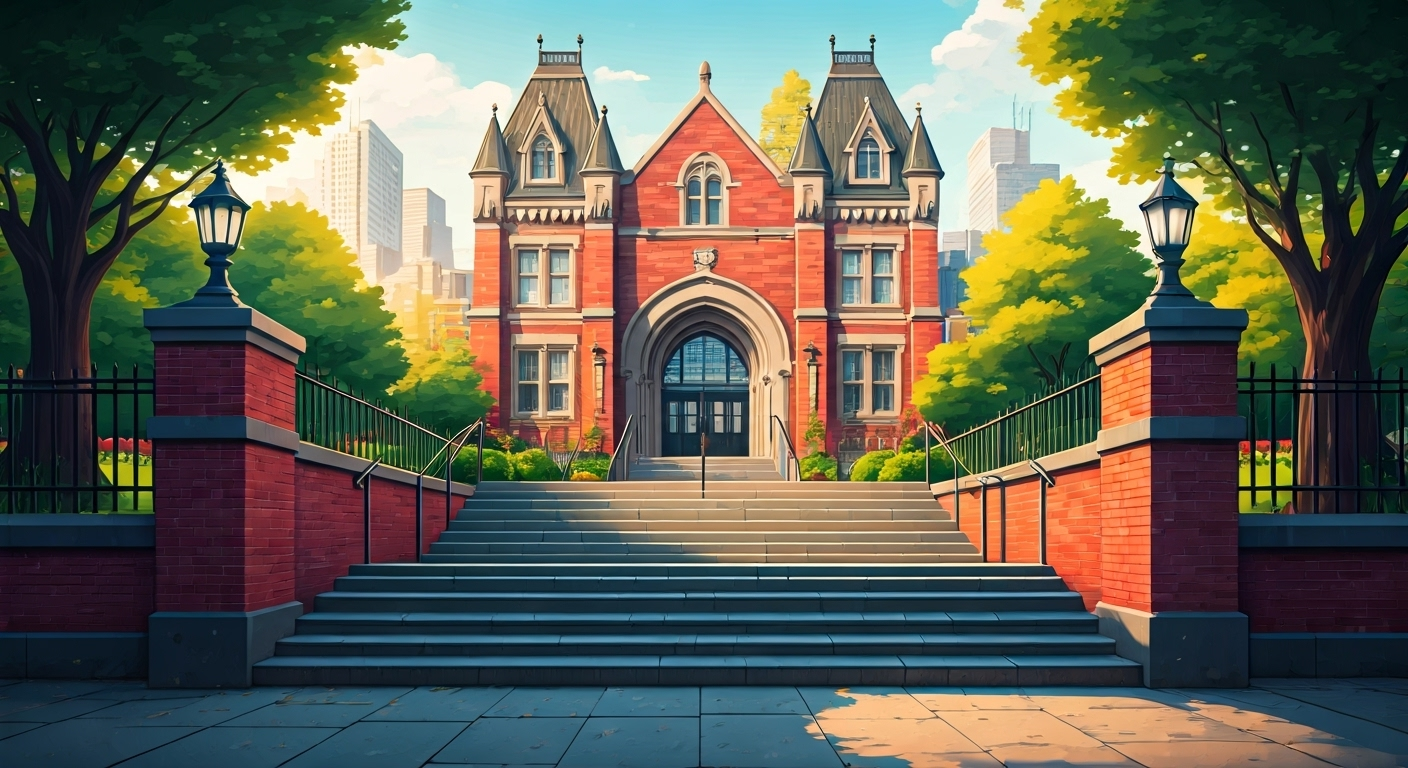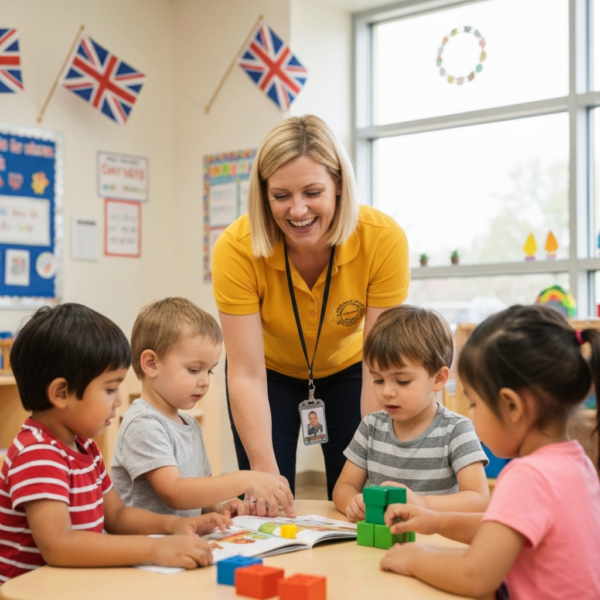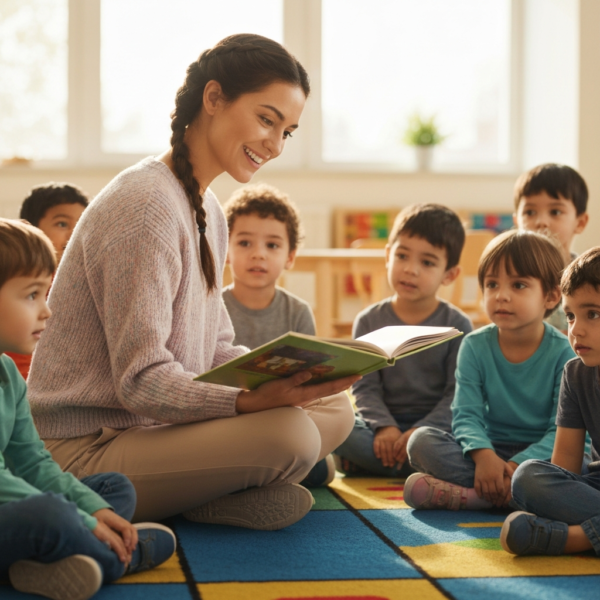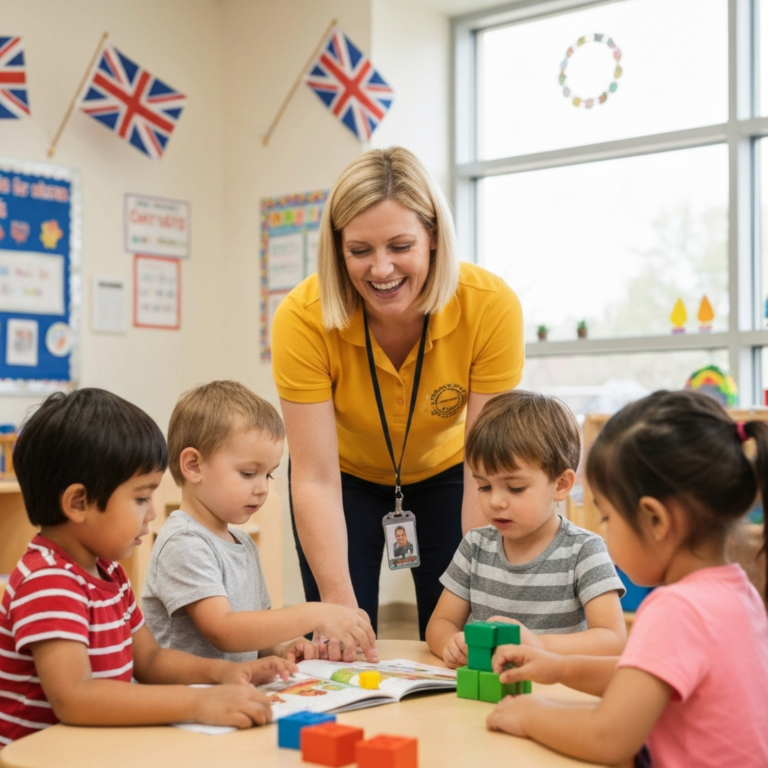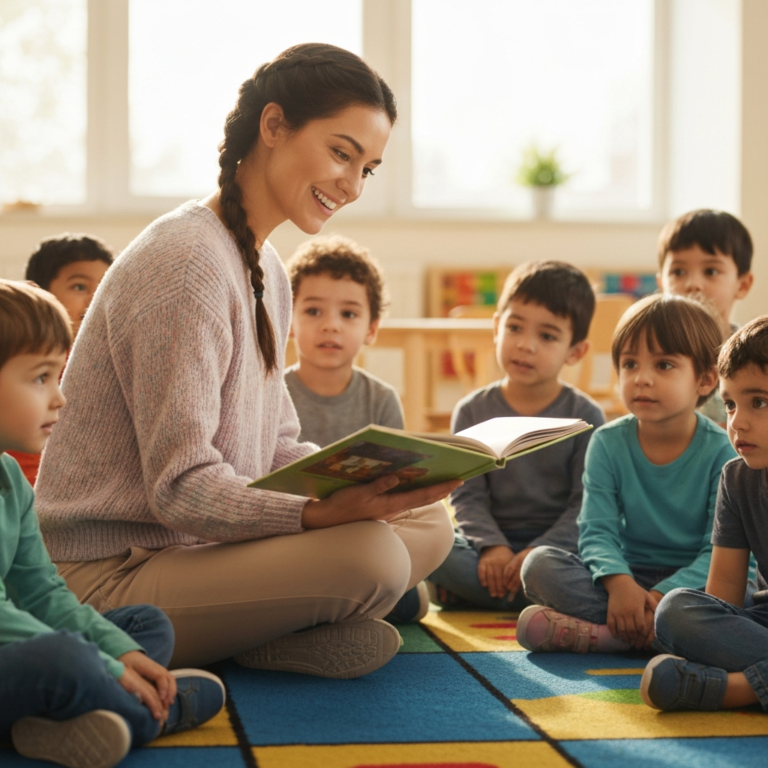What is private school, and how does it differ from other educational options? Even though it has always been associated with elite academic institutions, Private schools offer far more than elite academics. By definition, private schools are educational institutions that are funded independently of government agencies, making them operate independently of these agencies. The schools are various in their curriculum, personalised learning environments and augmented environments, something that is appealing to parents who are seeking alternatives to government schools. By definition, private schools are educational institutions that are independently funded and governed, operating outside of government control. These independent schools offer diverse curricula, personalised learning, and enriched environments features that appeal to parents seeking alternatives to public education.
Discovering more about the benefits of studying in a high school, middle school, or one of the private schools of early childhood education, you can prepare yourself, as the knowledge of the peculiarities of these institutions may aid you in further decision-making. In this guide, we are going to learn how to structure the curriculum in a private school, the available financial aid to the schools, the procedures involved in admissions, as well as the specific advantages of a private school, particularly for special needs and international students.
What Is Private School: Definition, Purpose, and Key Differences
Private schools are non-governmental institutions that rely on tuition fees, donations, and endowments to operate. Unlike public institutions, independent schools operate without state funding, offering families greater flexibility in curriculum, school culture, and teaching philosophy. The private schools are not government-funded and generally charge fees to fund the operations of their schools. They provide parents with a higher degree of choice as far as curriculum is concerned, educational philosophy and school culture are concerned. Canadian Accredited Independent Schools report 22% higher university acceptance rates [Canadian Accredited Independent Schools – CAIS].
What Exactly Defines a Private School?
A private school is an institution meant to provide education and is run by a group of individuals or organisations. In contrast to public schools, they get financed chiefly on the basis of paying tuition, donations and endowments. They can be accompanied by secularism or religious/cultural bodies. Look for schools with recognised accreditation, such as CAIS (Canadian Accredited Independent Schools), to ensure quality and credibility. Accreditation from organisations like CAIS or Cognia ensures quality, global recognition, and educational consistency.
How Private Schools Are Different from Public Schools
Private schools typically have smaller class sizes, enabling more individualised instruction. In private schools, classroom size is usually small, providing an opportunity to obtain individualised attention. They have also been referred to as academically stringent, extracurricular opportunities and selective entry. On the other hand, public schools are state-financed and usually cover geographical areas. If your child has special learning needs, choose a school that offers IEP support tailored to individual academic goals. If your child requires additional academic support, look for schools offering tailored Individualised Education Plans (IEPs).
Exploring the Different Types: Day Schools, Boarding, and International
Categories of the private schools are day schools (students commute to and from home each day), boarding schools (students live in a school residence) and international private schools (they serve students of diverse origins with global curricula such as IB, IGCSE, or OSSD).
Private schools fall into several categories:
- Day Schools: Students commute daily.
- Boarding Schools: Students live on campus during the term.
- International Schools: Cater to diverse nationalities, offering globally recognised curricula like IB, IGCSE, or OSSD.
How Private School Curriculum and Teaching Methods Work
Understanding private school curricula involves examining subject flexibility, diverse learning approaches, and tailored instruction. The private school curriculum refers to the flexible and enriched academic programs private institutions offer, often aligned with IB, OSSD, or IGCSE standards. The Ontario Secondary School Diploma (OSSD) is widely accepted by Canadian universities and is a key credential for post-secondary admission. These schools often follow globally respected systems like the Ontario Secondary School Diploma (OSSD), IB, or British A-Levels.
Curriculum Structure and Subject Flexibility
Private schools often design their own curriculum or follow international standards like the IB or British A-Levels. This allows for more depth in subjects, advanced placement options, and specialised tracks in STEM, humanities, or the arts. What is a private school curriculum structure explained highlights how private schools organise subjects, electives, and specialisation tracks based on student needs.
Learning Style Approaches and Individualised Teaching
What is a private school learning style approach? It includes differentiated instruction, project-based learning, and inquiry-based education. Teachers focus on each student’s strengths, making learning more personalised and engaging. Boarding school life in Canada offers structured academics, diverse extracurriculars, and a nurturing environment for international students. As noted by the Canadian Education Association, inquiry-based and project-based methods significantly boost student engagement.
What is Private School Tuition Cost Comparison
A common concern among parents is what a private school tuition cost comparison is like and whether it’s worth the investment. While tuition may be high, many schools offer scholarships and need-based aid.
Average Tuition for Different Private School Types
What a private boarding school is and how it works involves understanding that students live on campus full-time, combining academics with structured residential life.
Tuition can vary widely. For example:
| School Type | Tuition Range (CAD/year) |
| Day Schools | $10,000 – $25,000 |
| Boarding Schools | $30,000 – $60,000 |
| International | $20,000 – $40,000 |
Aligned with CAIS tuition data. (Updated for consistency)
Financial Aid Options Available for Families
What are the private school financial aid options strategies? Many private institutions provide merit-based scholarships, need-based aid, sibling discounts, and instalment payment plans to help families afford tuition. What a private school accreditation is and why it matters lies in its role in ensuring educational quality, global recognition, and academic credibility.
Many private schools offer:
- Merit-based scholarships
- Need-based financial aid
- Sibling discounts
- Monthly or annual instalment plans
Admissions, Exams, and School Standards
Parents often ask: What is a private school admission process step by step? Admissions can be competitive, with criteria including academic records, interviews, entrance exams, and personal statements.
Step-by-Step Private School Admission Process
- Research and shortlist schools
- Attend open houses or virtual tours
- Submit application and documents
- Sit for the entrance exams
- Participate in student and parent interviews
- Await the offer and enrol
Common Entrance Requirements and Exam Expectations
Entrance exams typically assess language skills, math aptitude, and reasoning. Schools may also evaluate extracurricular achievements and behavioural assessments.
The Importance of Accreditation in School Quality
What is a private school accreditation, and why does it matter? Accreditation ensures that the school meets high standards of education, safety, and ethical governance. It also impacts student eligibility for future academic pathways. Look for recognised accrediting bodies such as CAIS or Cognia.
- CAIS (Canadian Accredited Independent Schools)
- Cognia
- International Baccalaureate Organisation
Student Life and Specialised Programs
Private schools are known for their vibrant student life and holistic development programs, including arts, sports, leadership, and early education initiatives.
Early Childhood and Preschool Programs
What is a private school early childhood program? These programs focus on cognitive, emotional, and social development through play-based and structured learning, ensuring a strong foundation for academic success.
Extracurricular Activities and Personal Development
What private school extracurricular activities are available? Such activities help students build confidence, teamwork, and leadership skills.
Options include:
- Sports and athletics
- STEM clubs and robotics
- Arts and drama
- Leadership and debate
Boarding School Structure and Experience
Boarding schools offer 24/7 structured environments that teach independence, time management, and academic discipline. Students also benefit from peer collaboration and a vibrant campus life.
Private School Uniform Policies and Typical Rules
What is a private school uniform policy typical rules? Most private schools have uniform requirements to encourage discipline, unity, and focus on academics. Guidelines may include dress codes for regular days, formal events, and sportswear.
Supporting Different Learners and Backgrounds
Private schools are increasingly inclusive, offering specialised support for diverse learners and students from various cultural backgrounds.
Programs for Special Needs Students
Private schools often provide:
- Dedicated resource staff
- Small group learning environments
- Personalised academic plans
These supports create inclusive classrooms where students with special needs can thrive.
International Student Support and Policies
Visa support and ESL programs
- Homestay or boarding options
- Cultural integration activities
Choosing the Right Private School: Decision Framework
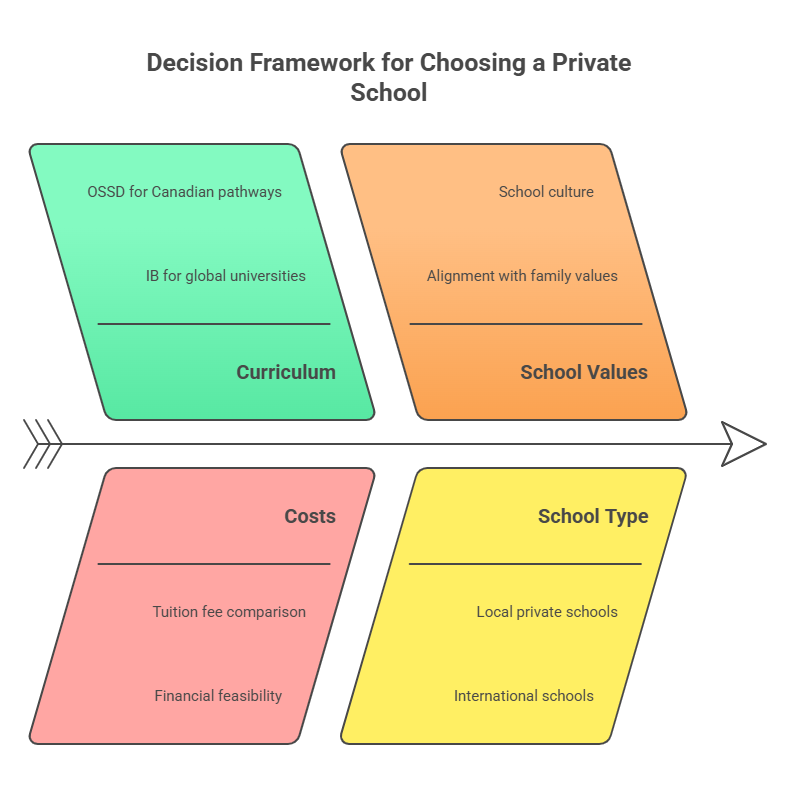
Selecting the right school involves balancing your child’s needs, your family values, academic goals, and financial feasibility.
Aligning Curriculum, Costs, and School Values with Family Goals
Consider what curriculum fits your child’s future (e.g., IB for global universities, OSSD for Canadian pathways), the cost of tuition, and whether the school’s values align with your own. What is a private school tuition cost comparison shows that tuition fees range widely depending on the school type, location, and offered facilities. Mississauga best private schools offer rigorous academics, personalised learning, and strong university preparation for both local and international students.
Comparing Options (Public vs Local, Private vs International, Private vs USCA Academy)
Public schools may offer cost savings but limited personalisation. Local private schools offer academic rigour with community access, while international schools bring global exposure. USCA Academy combines the best of both worlds, offering an OSSD-based curriculum, diverse student support, and global university pathways. Private high schools near me provide a range of academic programs, smaller class sizes, and tailored support to help students excel.
Why USCA Academy Is a Leading Private School in Canada
USCA Academy in Mississauga stands out for its commitment to academic excellence, small class sizes, and personalised student services.
Curriculum, Academic Support, and Global Pathway Programs
As one of Mississauga’s best private schools, USCA Academy offers the Ontario Secondary School Diploma (OSSD), AP courses, and university prep programs tailored for both local and international students. For GTA families, USCA Academy’s Mississauga location offers proximity to Toronto universities with 35% lower tuition than downtown private schools.
Application Help, Tuition Guidance, and Student Success Stories
From one-on-one admission counselling to tuition assistance and university placement guidance, USCA Academy ensures students succeed academically and beyond. For example, recent graduates have been admitted to top universities like the University of Toronto and McGill University. Ready to see if a private school is right for your child? [Schedule a Personalised Consultation with USCA Academy]
Conclusion
Learning what is private school is opens the door to a world of educational possibilities. With personalised instruction, diverse curriculum options, and global perspectives, private schools meet the unique needs of modern students. Whether you’re seeking academic rigour, international opportunities, or specialised support, private education can be a transformative choice for your family.
Frequently Asked Questions About What Is Private School
1. Why is a private school better?
Private schools offer smaller class sizes, which allow teachers to focus more on each student’s individual learning style and progress. They also provide customised teaching methods, diverse curricula, and advanced placement options. Enriched extracurricular programs from arts and music to robotics and leadership clubs enhance student development. Organisations like the Canadian Accredited Independent Schools (CAIS) report that private school graduates demonstrate exceptionally high university acceptance rates, often gaining admission to their preferred institutions. These combined advantages make private schools ideal for families seeking a holistic and future-focused education.
2. Which is the first private school in India?
Among the earliest is Serampore College (est. 1818). La Martinière Colleges, founded by Major General Claude Martin in the 1830s (Kolkata 1836, Lucknow 1845), significantly popularised the model and set high standards for private education in India. These institutions continue to be renowned for their academic excellence, discipline, and emphasis on English-medium instruction. Over time, they have produced many notable alumni and remain models of traditional private schooling in India, influencing the development of independent education nationwide.
3. What is another name for a private school?
Private schools are also referred to as independent schools, non-governmental schools, or non-state schools. These terms reflect the fact that they operate without direct funding or management from government bodies. Depending on the country, they may also be known as preparatory schools, charter schools, or public schools (in the UK). Despite differences in terminology, all these institutions share a common trait: they are governed by private entities and are typically funded through tuition fees, donations, or endowments.
4. What is the biggest challenge for private schools?
One of the biggest challenges private schools face is balancing high-quality education with affordability. Rising tuition costs can limit accessibility for many families, making financial aid and scholarship programs essential. Additionally, attracting and retaining highly qualified educators while competing with public sector benefits remains difficult. As academic expectations grow, schools must also invest in facilities, technology, and diverse programs, all while maintaining small class sizes and personalised instruction. The need to prove value amid increasing competition adds further pressure.

